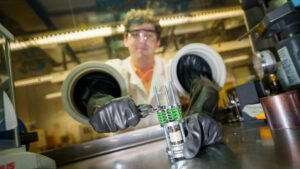ButSpeak.com
News which Matters.

Researchers from the University of Chicago and UC San Diego create the world’s first anode-free sodium solid-state battery, offering a safer, cheaper, and more sustainable solution for energy storage.
A groundbreaking innovation in battery technology has been achieved by a research team comprising scientists from the University of Chicago and the University of California, San Diego. They have developed what they are calling the world’s first anode-free sodium solid-state battery, a breakthrough that could revolutionize energy storage and significantly advance the transition to clean energy.
This innovative battery design successfully combines three previously distinct technologies—sodium, solid-state, and anode-free batteries—into a single, efficient unit. “Although there have been previous sodium, solid-state, and anode-free batteries, no one has been able to successfully combine these three ideas until now,” explained Grayson Deysher, a doctoral candidate at UC San Diego and the paper’s first author.
Traditional lithium-ion batteries, while effective, rely on materials that are expensive and increasingly difficult to source. These batteries also carry a risk of fire due to potential overheating or short circuits, though such incidents are rare. In contrast, the new sodium-based battery offers a safer, more sustainable alternative.
Sodium is a much more abundant and cost-effective material than lithium. While lithium is found at a concentration of 20 parts per million in Earth’s crust, sodium is present at 20,000 parts per million, and it is also plentiful in seawater. This abundance makes sodium a more viable option for large-scale battery production.
The Chicago/San Diego team’s solid-state battery also replaces traditional liquid electrolytes with a solid substance, which provides significant advantages in both power and safety. A unique aspect of their design is the use of an aluminum powder current collector, which they describe as a “solid that flows.” This material surrounds the electrolyte, addressing some of the operational challenges that have plagued solid-state batteries in the past.
This powder was densified under high pressure to create a solid current collector that still maintains liquid-like contact with the electrolyte, leading to lower costs and higher efficiency in energy cycling. Additionally, by eliminating the anode, the researchers have reduced the amount of expensive materials needed, further driving down the cost while boosting energy storage capacity and cell voltage.
The implications of this breakthrough are substantial. With its use of abundant materials and advanced chemistry, the new battery design promises to be more affordable, environmentally friendly, and powerful than current options. These attributes are critical for powering electric vehicles (EVs) and other technologies that are central to the push for cleaner energy.
This development is part of a broader effort to rapidly advance power storage technologies, which are crucial for the transition to renewable energy sources. Reducing reliance on fossil fuels is essential for cutting down on heat-trapping emissions that contribute to climate change and harm human health. The shift to electric vehicles, supported by innovations like this new battery, is well underway. In fact, a record 1.2 million EVs were sold in the U.S. last year, each one reducing air pollution and saving motorists money on fuel.
The Chicago/San Diego team is now seeking patents for their anode-free sodium solid-state battery, which has demonstrated stable operation through hundreds of cycles in testing. “To accomplish our mission of decarbonizing our economy, we need several hundred terawatt hours of batteries,” said Y. Shirley Meng, a professor at the University of Chicago. “We need more batteries, and we need them fast.”
This new technology represents a significant step toward meeting that demand and accelerating the global shift to a cleaner, more sustainable energy future.